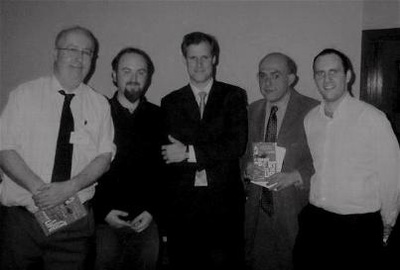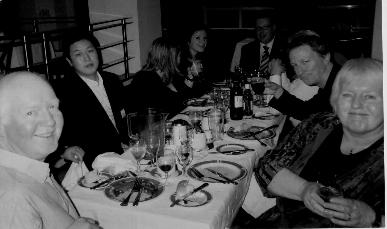Annual conference 2009
the governance and regulation of sport, birkbeck sport business centre, birkbeck college, london
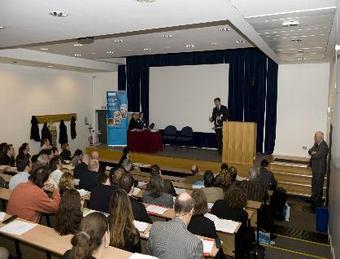
The 3rd Annual Conference was held at Birkbeck Sport Business Centre, Birkbeck College, University of London, on 20-21 February 2009. The theme of this year’s conference was the governance and regulation of sport. The conference was our biggest yet, attracting 120 delegates, including keynote addresses, 15 sessions and 45 papers. The conference brought together government representatives, sports administrators, representatives of sport governing bodies, and academics from a variety of disciplines. The conference had a truly international flavour with colleagues joining us from Denmark, Cyprus, Portugal, Japan, Italy, France, Austria, Germany and Brazil to give their own unique perspectives on the governance and regulation of sport.
The conference kicked-off with a series of keynote addresses. Alan Keen MP, Chairman of the All-Party Parliamentary Football Group, which has recently carried out an enquiry into the governance and regulation of English Football, discussed the motivation for the Group's enquiries, notably a concern that football's role as a major cultural asset has been endangered by overly aggressive commercialism. He outlined some of the latest Enquiry's initial findings.
Alex Phillips, Head of Professional Football Services, UEFA, highlighted how a modern governing body in the football industry has a duty to regulate in the interest of all the stakeholders of the game, from the grassroots to the elite professional leagues. He discussed the relationship between governing bodies and leagues, making some observations on the potential benefits of particular policy measures in the areas of club ownership, for example the Fit & Proper Person Test.
The conference kicked-off with a series of keynote addresses. Alan Keen MP, Chairman of the All-Party Parliamentary Football Group, which has recently carried out an enquiry into the governance and regulation of English Football, discussed the motivation for the Group's enquiries, notably a concern that football's role as a major cultural asset has been endangered by overly aggressive commercialism. He outlined some of the latest Enquiry's initial findings.
Alex Phillips, Head of Professional Football Services, UEFA, highlighted how a modern governing body in the football industry has a duty to regulate in the interest of all the stakeholders of the game, from the grassroots to the elite professional leagues. He discussed the relationship between governing bodies and leagues, making some observations on the potential benefits of particular policy measures in the areas of club ownership, for example the Fit & Proper Person Test.
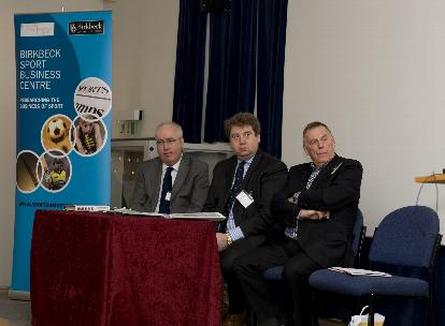
Photo (left to right) Sean Hamil, Birkbeck College; Nick Bunting, RFU and Alan Keen MP
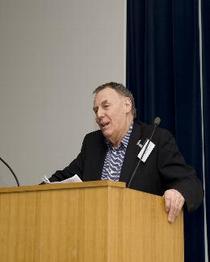
Nick Bunting, Head of Public Affairs & Planning at the Rugby Football Union discussed the challenges faced by the sport. He revealed how the RFU, like many traditional governing bodies, has had to face the challenge of managing the demands and aspirations of developing professional Rugby Union clubs and leagues (the Guiness Premiership) domestically, with a European dimension (the Heineken Cup), whilst still protecting, nurturing and investing in the game's grassroots and promoting the interests of the national team. Nick's presentation provided an overview of how the RFU has met these challenges, in particular focusing on the critical role of the RFU as the representative body of all rugby union, including the grassroots, in developing the game into the future in a highly competitive environment.
Following the keynote there were 15 sessions spread out over a day and a half, covering the following thematic areas:
A number of papers were directed toward critiquing current practices in sport governance and regulation, from the effects of commercialisation to persistent forms of social exclusion. Many papers engaged with comparative, theoretical and historical dimensions. It was encouraging to see a number of postgraduate students present findings from their current research, and to see many returning faces from previous events. The sessions were well attended throughout the two days with probing questions from the floor.
The conference ended on Saturday 21 February with a plenary session on corruption in sport led by former British Olympic high-jumper Geoff Parsons. Geoff provocatively charged the world of elite sport with complicity for failing to tackle corruption root and branch. He concluded: "As sport's only 'police force' (WADA) chases kids round the world for blood and urine samples, the rest of the sporting structure is left only to the scrutiny of the press, the helpless and the guilty." The Emperor has no clothes!
Prof Alan Tomlinson (University of Brighton) closed the conference by drawing on research on FIFA conducted since 1985 which has looked into the governance of the world game. He stated that FIFA's 1996-2007 motto 'For the good of the game' has now gone, replaced by 'For the game. For the world'. 'Authenticity, unity, performance and integrity', its mission statement claims; fair play, tolerance, sportsmanship and transparency, too. But deal-making with and within its regional federations, international associations and corporate sponsors show where FIFA ambitions and loyalties really lie. He highlighted how personal aggrandizement has shaped FIFA policy as much as sporting and international ideals; its KPMG-audited accounts for 2006 declared 912 million Swiss Francs income, and only 609 million expenses, FIFA's richest ever year. Yet in 2008 a Swiss court was still investigating allegations of £66 million bribes, and in 2007/8 the organisational watchdog One World Trust reported FIFA to be the most unaccountable INGO in its world sample. He concluded: 'Not for the Game. For the FIFAcrats' might be the more appropriate slogan.
Following the keynote there were 15 sessions spread out over a day and a half, covering the following thematic areas:
- Perspectives on the role of sport governing bodies
- Doping in sport
- The governance of cricket
- Governance in European football
- UK government policy in the sporting context
- Bidding for sport events: key issues for policymakers
- Sports governance: lessons from historical and contemporary practice
- Theoretical issues in sport governance
- Governance in European sport
- The governance of youth sport
- Public policy and football supporters: a continuing challenge
- Third party player ownership
- Governance responses to financial instability in the sport industry
- Governance in world sport
- Controversies in sport governance: ideas for a reform agenda
A number of papers were directed toward critiquing current practices in sport governance and regulation, from the effects of commercialisation to persistent forms of social exclusion. Many papers engaged with comparative, theoretical and historical dimensions. It was encouraging to see a number of postgraduate students present findings from their current research, and to see many returning faces from previous events. The sessions were well attended throughout the two days with probing questions from the floor.
The conference ended on Saturday 21 February with a plenary session on corruption in sport led by former British Olympic high-jumper Geoff Parsons. Geoff provocatively charged the world of elite sport with complicity for failing to tackle corruption root and branch. He concluded: "As sport's only 'police force' (WADA) chases kids round the world for blood and urine samples, the rest of the sporting structure is left only to the scrutiny of the press, the helpless and the guilty." The Emperor has no clothes!
Prof Alan Tomlinson (University of Brighton) closed the conference by drawing on research on FIFA conducted since 1985 which has looked into the governance of the world game. He stated that FIFA's 1996-2007 motto 'For the good of the game' has now gone, replaced by 'For the game. For the world'. 'Authenticity, unity, performance and integrity', its mission statement claims; fair play, tolerance, sportsmanship and transparency, too. But deal-making with and within its regional federations, international associations and corporate sponsors show where FIFA ambitions and loyalties really lie. He highlighted how personal aggrandizement has shaped FIFA policy as much as sporting and international ideals; its KPMG-audited accounts for 2006 declared 912 million Swiss Francs income, and only 609 million expenses, FIFA's richest ever year. Yet in 2008 a Swiss court was still investigating allegations of £66 million bribes, and in 2007/8 the organisational watchdog One World Trust reported FIFA to be the most unaccountable INGO in its world sample. He concluded: 'Not for the Game. For the FIFAcrats' might be the more appropriate slogan.
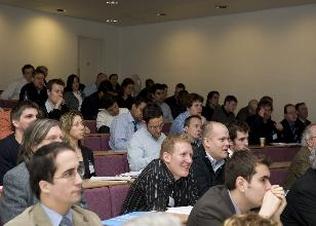
In line with previous events the conference dinner included an after-dinner speaker. This year's after-dinner talk was given by former Test cricketer, and now author, Ed Smith, who drew upon his recent book What Sport Tells Us About Life (Penguin Books) to sketch some political meanings of sport. The audience were treated to his views on elite sport, the governance of cricket, and making it as a sportsman turned author/journalist.
Thanks go to Sean Hamil and Dr Geoff Walters at Birkbeck College for putting on such a diverse programme, managing the conference with high professionalism, and keeping up the tradition of critical discussion mixed with a friendly welcome.
Conference Organising Committee
Paul Gilchrist, University of Brighton
Sean Hamil, Birkbeck, University of London
Dr Russell Holden, Director, In the Zone, Sport and Politics Consultancy
Dr Geoff Walters, Birkbeck, University of London
Full programme
Thanks go to Sean Hamil and Dr Geoff Walters at Birkbeck College for putting on such a diverse programme, managing the conference with high professionalism, and keeping up the tradition of critical discussion mixed with a friendly welcome.
Conference Organising Committee
Paul Gilchrist, University of Brighton
Sean Hamil, Birkbeck, University of London
Dr Russell Holden, Director, In the Zone, Sport and Politics Consultancy
Dr Geoff Walters, Birkbeck, University of London
Full programme
